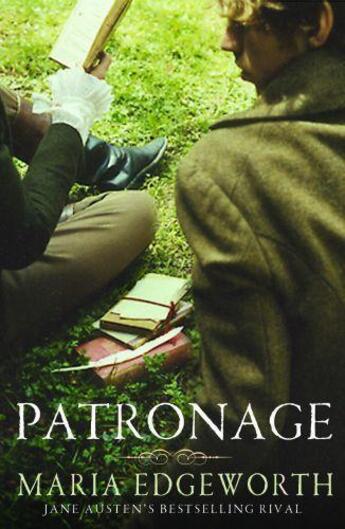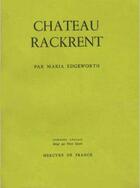-
Nombre de pages : (-)
-
Collection :
(-)
-
Genre :
(-)
-
Thème :
Non attribué
-
Prix littéraire(s) :
(-)
Résumé:
About Patronage: She set out to write an adventurous soap opera about the trails and fortunes of two neighbouring families in Regency England. She ended with a searing critique of corruption within British public and private life and a rare insight into the opportunities available for young men... Voir plus
About Patronage: She set out to write an adventurous soap opera about the trails and fortunes of two neighbouring families in Regency England. She ended with a searing critique of corruption within British public and private life and a rare insight into the opportunities available for young men making their way in Regency society. Praised as both entertaining and profound (Jeremy Bentham called it 'admirable...instilling the love of justice and veracity') Patronage is an engrossing, page-turner of a read which chimes with these recessionary times. Maria Edgeworth's epic tale reflects the liberal views of her father. She may have influenced Sir Walter Scott and Ivan Turgenev, and been a high-profile activist for the famine-stricken Irish during her lifetime, but Maria Edgeworth has since lost ground to her contemporary Jane Austen. Patronage was first published in 1814, a year after Pride and Prejudice, when Edgeworth was far more renowned (and well-paid) than her rival, and this sprawling narrative offers plenty of scope for Colin Firth to turn up in a wet shirt and beget an Edgeworth revival. The novel centres around the Percy family, an upstanding bunch whose good humour is undented even by the shipwreck, the house fire and the devastating machinations of an evil relation which befall them within quick succession. Their moral fibre and naive optimism don't drive great drama, so fortunately they are contrasted with their more scheming cousins, the Falconers. Between them, the two families demonstrate the various aspects of patronage, the Percy patriarch being opposed to the "ruinous system" of achieving professional or personal status by any means other than merit, despite the Falconers' contrasting approach having more immediate advantages. Alongside the familiar element of daughters finding suitably lovable/wealthy/powerful husbands, Edgeworth pays equal attention to the problem of dispensing of sons, whose careers and social standing require as much underhand strategy as marriages. The author's father, the politician and author Richard Lovell Edgeworth, held progressive views about women's role in society and right to be educated, which are reflected in the liberal attitude pervading the story. Aspects of the tome have inevitably dated in the near-200 years since its original publication: the 19th-century punctuation gives much of the text a frantic air, and there's a certain lack of verbal economy; but at the same time there's that satisfying feeling that by the end, no ends will be left untied, and right will reign.
Donner votre avis















